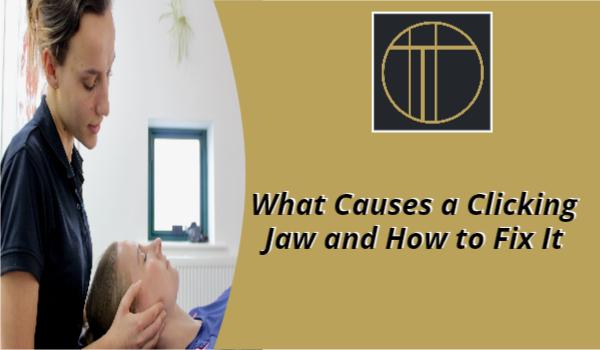What Causes a Clicking Jaw and How to Fix It?

Clicking Jaw Treatment
A clicking jaw, also known as temporomandibular joint disorder (TMD), is a common condition that affects millions of people worldwide. It occurs when the joint that connects your jawbone to your skull becomes misaligned or inflamed. This can cause a variety of symptoms, including pain, clicking or popping noises, and difficulty opening or closing your mouth.
In this blog post, we will discuss the causes of a clicking jaw and explore some effective treatment options.
Causes of a Clicking Jaw
There are several factors that can contribute to a clicking jaw treatment, including:
- Stress and anxiety: Excessive stress and anxiety can lead to clenching or grinding your teeth, which can put strain on the temporomandibular joint (TMJ).
- Injury: A blow to the jaw or face can cause damage to the TMJ.
- Arthritis: Arthritis can cause inflammation and pain in the TMJ.
- Tooth misalignment: Misaligned teeth can put stress on the TMJ.
- Gum disease: Gum disease can lead to inflammation and infection, which can affect the TMJ.
Symptoms of a Clicking Jaw
The symptoms of a clicking jaw can vary from person to person, but they may include:
- Pain in the jaw, face, or neck
- Clicking or popping noises in the jaw
- Difficulty opening or closing your mouth
- Locking of the jaw
- Headaches
- Earaches
- Dizziness
Diagnosis of a Clicking Jaw
If you are experiencing symptoms of a clicking jaw, it is important to see a dentist or doctor for a diagnosis. They will examine your jaw and may order X-rays or other tests to determine the cause of your symptoms.
Treatment for a Clicking Jaw
There are several treatment options available for a clicking jaw, including:
- Home remedies: Home remedies such as applying heat or cold to the jaw, avoiding chewing on hard foods, and practicing stress-reduction techniques can help relieve symptoms.
- Medication: Over-the-counter pain relievers or prescription medications can help manage pain and inflammation.
- Physical therapy: Physical therapy can help improve jaw function and reduce pain.
- Splint or nightguard: A splint or nightguard can help prevent teeth grinding and reduce stress on the TMJ.
- Surgery: In severe cases, surgery may be necessary to correct the underlying problem.
Preventing a Clicking Jaw
There are several steps you can take to help prevent a clicking jaw, including:
- Managing stress and anxiety
- Eating a healthy diet
- Avoiding chewing on hard foods
- Practicing good oral hygiene
- Seeing a dentist for regular checkups
Conclusion
A clicking jaw is a common condition that can be caused by a variety of factors. While it can be uncomfortable and painful, there are effective treatment options available. If you are experiencing symptoms of a clicking jaw, it is important to see a dentist or doctor for a diagnosis and to discuss treatment options.
Please leave a comment below if you have any questions or would like to share your experiences with a clicking jaw.
- Art
- Causes
- Crafts
- Dance
- Drinks
- Film
- Fitness
- Food
- Games
- Gardening
- Health
- Home
- Literature
- Music
- Networking
- Other
- Party
- Religion
- Shopping
- Sports
- Theater
- Wellness


